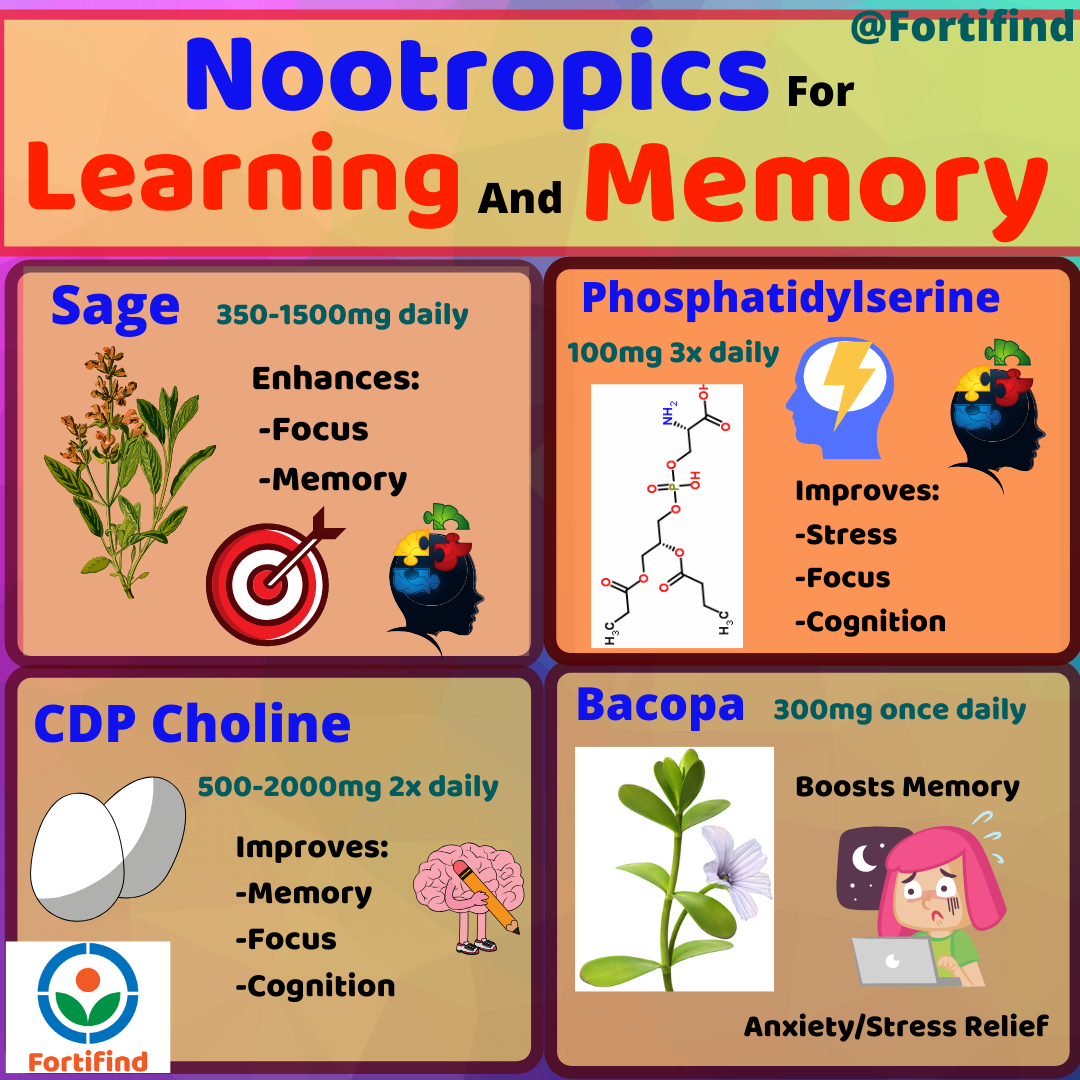What Are Nootropics?
How Supplements Can Help Students Improve Memory
Written by: Glen Greenberg, Clinically Verified by: Matt Marshall, PharmD.

Any college or grad student can attest to the rigorous demands of university life. It really tests a person’s ability to focus on droning professors and research papers for hours on end. After all, that’s what the real world is like, right?
Well, for those of you looking to make it through the next test or rotation, consider cognitive enhancing supplements called Nootropics to help with memory, focus and stress relief.
Not only do they boost brain power, but they also fit right into a college student’s budget! (Which is to say, not very much.)

Note: To help save you some time and money, we’ve researched the best brands on the market for the supplements discussed below. Throughout the article you will find links to our recommended brands – check them out and feel free to compare with your own research! For the sake of transparency – we earn a small commission (about 5%) from Amazon, not the brand; which means that we can not only continue to create high quality educational content, but we can remain 100% free of bias as well!
ALCAR
The Science: Acetyl-L-Carnitine, or ALCAR, boosts attention, focus and memory by reducing mental fatigue. ALCAR works better than its sibling supplement, L-carnitine, through its ability to cross the blood-brain barrier, giving it a more potent effect.
This nootropic is also an excellent choice for anyone looking to reduce the symptoms of fibromyalgia, chronic fatigue syndrome, or ADHD.
How to: ALCAR can be purchased as a capsule or in powder form. Take 600-2500mg daily, increasing the dosage until reaching desired results.
CDP choline
The Science: Only a handful of nootropic supplements are supported by reputable research for enhancing brain power, but CDP-choline stands out as a shining example.
It improves the productivity of the mitochondria (the powerhouse of the cell) in the brain. More energy in your brain means better memory and learning ability, as well as protection from age-related memory decline.
Increased brain activity also helps reduces symptoms of depression, which we know is comorbid with being a student.
How to:Start with 500mg twice daily. Bump up the dose up to 1000mg twice daily as needed for desired effect.
Sage
The Science:Sage possess properties that boost key elements in the brain, allowing you to focus longer and more efficiently. Perfect for those late-night cram sessions that you definitely didn’t procrastinate on.
Sage has been shown to increase cognition, memory, alertness, calmness and has the unique ability to banish bad spirits from cursed corners of your mind!
How to:Sage is sold in a variety of forms but should be taken at 300-600mg once daily.
Phosphatidylserine
The Science: Phosphatidylserine is a vital compound for cognitive function found primarily in brain tissue. While the body can synthesize it, several studies have shown that taking extra PS enhances attention and focus while reducing stress in younger patients.
For students, this is a dream come true, especially during the long hours of exam review week.
How to: Take 100mg 1-3 times daily. Consider using in conjunction with fish oil or other omega-3 to maximize the benefits of both.
Rhodiola Rosea
The Science: Adaptogens are supplements that help the user adapt to stress, with rhodiola rosea being a prime example.
It’s well documented that it aids in stress relief both immediately and long term while staving off stress-related fatigue. It may have additional stress reducing properties to help with chronic fatigue, high-stress lifestyles, and significant burnout.
Turns out, with less stress to distract you, the better you’ll focus on and retain information.
How to: Start with 200-300mg taken once daily. You may increase up to 600mg as required for desired effect.
Panax Ginseng
The Science: Like rhodiola rosea, ginseng is an adaptogen. Where ginseng really shines, though, is in its ability to quickly lower stress and increase energy without any overt side effects.
This makes it ideal for situations where stress may be impairing concentration, focus, and even libido.
How to: Take 200-400mg once daily.
Bacopa
The Science: Bacopa is yet another adaptogen shown to aid in memory and learning. The unique thing about Bacopa is that it enhances memory by slowing the process of forgetting. This makes it an excellent choice for students to increase recall ability, while combating test anxiety.
And, if you weren’t convinced, it pairs with everyone’s favorite stimulant; caffeine! Throw some bacopa in your morning espresso and you’ve got the elixir of excellent studying.
How to: Take 300mg of a 50 percent extract daily. Keep in mind as well that Bacopa takes time to work, so give it 1-2 months of daily use for the best effects.

Creatine
The Science: “But, Fortifind, isn’t creatine only for workout fiends and gym-rats?” Excellent question clever reader! The answer is that it isn’t if you’re creatine-deficient.
Creatine in the body is gained from meat in your diet. So people who don’t eat meat, have exceptionally low muscle mass (like the elderly), or people with very poor nutrition (aka, poor college students) habitually suffer from this deficiency.
Lacking creatine manifests as general fatigue, brain fog, and inability to concentrate.
If you notice these symptoms, belong to one of the populations at risk, or just enjoy hitting the weights in between hitting the books, consider adding creatine to your supplement list.
How to: Take 5 grams daily. It’s recommended to get as a powder as it’s inexpensive, mixes well, and is available in a wide variety of flavors.
While the above supplements are perfect for tired, stressed and unfocused students, there are some pitfalls to avoid when shopping around for what you want.
Gingko biloba
This supplement has had inconsistency in its studies, can be pricey and appears to be most effective to prevent age-related cognitive decline. There are just better options out there.
Vinpocetine
There is weak evidence to suggest it improves memory. However, this may be a side effect of its primary application, which is to increase blood flow for elderly folks or those who have brain injuries.
It isn’t particularly effective for younger, healthy individuals so, save your money for supplements that will be more effective.
Resveratrol
While it has been shown to improve cerebral blood flow, studies that specifically set out to investigate improved cognition failed to show any change. That’s not to say that resveratrol is unhelpful in any way (as it does act as an antioxidant,) it just doesn’t perform the same function we’re looking for here.
Homework, studying, term papers, and tests all require focus and memory, while causing an untold number of anxiety related headaches among students. These nootropic supplements can make your time at a university that much simpler. And, remember, always consult your local physician before starting any of the above supplements. Now, get back to work on that paper you’re procrastinating on!
Resources:
Cover Photo by sean Kong on Unsplash
First Photo by Johannes Plenio on Unsplash
Second Photo by Bonnie Kittle on Unsplash
ALCAR
- https://www.ncbi.nlm.nih.gov/pubmed/15039515
- https://www.ncbi.nlm.nih.gov/pubmed/12213433
- https://www.ncbi.nlm.nih.gov/pubmed/20098226
- https://www.ncbi.nlm.nih.gov/pubmed/17658628
- https://www.ncbi.nlm.nih.gov/pubmed/17543140
- https://www.ncbi.nlm.nih.gov/pubmed/21224234
CDP Choline
- https://www.cochranelibrary.com/cdsr/doi/10.1002/14651858.CD000269.pub2/pdf/CDSR/CD000269/rel0002/CD000269/CD000269_abstract.pdf
- https://www.ncbi.nlm.nih.gov/pubmed/2392950
- https://www.ncbi.nlm.nih.gov/pubmed/3136617
- https://www.ncbi.nlm.nih.gov/pubmed/9203170
Sage
- https://www.ncbi.nlm.nih.gov/pubmed/20937617
- https://www.ncbi.nlm.nih.gov/pubmed/16205785
- https://www.ncbi.nlm.nih.gov/pubmed/25934446
Phosphatidylserine
- https://www.ncbi.nlm.nih.gov/pubmed/20523044
- https://www.ncbi.nlm.nih.gov/pubmed/21103034
- https://www.ncbi.nlm.nih.gov/pubmed/25414047
- https://www.ncbi.nlm.nih.gov/pubmed/23723695
- https://www.ncbi.nlm.nih.gov/pubmed/18616866
- https://www.ncbi.nlm.nih.gov/pubmed/23495677
- https://www.ncbi.nlm.nih.gov/pubmed/21103402
Bacopa
- https://www.ncbi.nlm.nih.gov/pubmed/18611150
- https://www.ncbi.nlm.nih.gov/pubmed/18683852
- https://www.ncbi.nlm.nih.gov/pubmed/23354535
- https://www.ncbi.nlm.nih.gov/pubmed/20590480
- https://www.ncbi.nlm.nih.gov/pubmed/12404571
- https://www.ncbi.nlm.nih.gov/pubmed/12093601
- https://www.ncbi.nlm.nih.gov/pubmed/23281132
- https://www.ncbi.nlm.nih.gov/pubmed/18611150
- https://www.ncbi.nlm.nih.gov/pubmed/18683852
Panax Ginseng
- https://www.ncbi.nlm.nih.gov/pubmed/16401645
- https://www.ncbi.nlm.nih.gov/pubmed/20737519
- https://www.ncbi.nlm.nih.gov/pubmed/15982990
- https://www.ncbi.nlm.nih.gov/pubmed/11895046
Rhodiola Rosea
- https://www.ncbi.nlm.nih.gov/pubmed/19016404
- https://www.ncbi.nlm.nih.gov/pubmed/19500070
- https://www.ncbi.nlm.nih.gov/pubmed/11081987
- https://journals.plos.org/plosone/article?id=10.1371/journal.pone.0108416
Creatine










